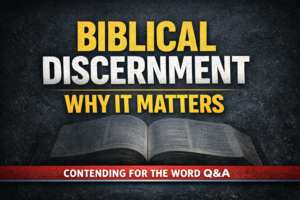⏱️ Estimated Reading Time: 6 min read
Mention the word “Calvinism” and you’re likely to get some strong negative responses. Most of these responses sadly will be a caricature of the position based on misunderstandings that people have about Calvinism. In For Calvinism by Dr. Michael Horton, J. Gresham Machen Professor of Systematic Theology and Apologetics at Westminster Seminary California seeks to deal with these caricatures by exploring the teachings of Calvinism itself by showing how it is biblical and God-centered, leading God’s people to live their lives for the glory of God. As Horton does this he explores the historical roots of Calvinism, walking readers through the Five Points of TULIP and encouraging his readers to consider its rich resources for faith and practice in the twenty-first century.
The biggest contribution For Calvinism contributes to the many books on Reformed theology is the depth of biblical and theological insight. One of the greatest weaknesses of the companion volume Against Calvinism is that Dr. Olson didn’t engage the Word of God. In this book, Dr. Horton avoids the pitfall of not engaging the Word of God by faithfully engaging what the Bible teaches. The chapters I appreciated the most were chapter seven “Calvinism and Christian missions” and the final chapter “Calvinism Today: A SWOT Analysis”.
In chapter seven Dr. Horton answers the all too common charge that Calvinists do not believe in evangelism. In his response he demonstrates how Calvinists have played a prominent role in modern missions and evangelism because of their biblical and theological convictions (Horton, 152). At the heart of his comments in chapter seven is this statement, “Election reminds us that God is the original missionary and that God’s people have the privilege of serving alongside him in his execution of that plan. The Church is God’s creation, not ours” (Horton, 165).
Several other quotes from this chapter are noteworthy and help to address this issue: “Election affords assurance not only of our assurance but of God’s ability to overcome the unbelief of friends and loved ones, no matter how hard their hearts” (Horton, 166). “Only because God is soveriegnly gracious missionary are God’s people able to take u our responsibility and privilege of witness to his gospel. And only because he alone is the Savior can we bear that responsibility with humility and freedom rather than slavish guilt or self-righteous pride” (Horton, 168).
Ultimately election reminds God’s people that it isn’t about them but all about Jesus. The biblical teaching on election ought to drive the people of God to their knees in submission to the One- Jesus Christ whose death and resurrection secured their salvation. This teaching gives the Christian confidence that God will use His Gospel and His people in the lives of others to bring them to the Chief Shepherd– the Lord Jesus Christ. Rather than doing away with missions, Calvinism provides a basis upon which the Christian doesn’t need to rely upon themselves, but upon God who transfers sinners from the kingdom of darkness to the kingdom of the Lord Jesus Christ.
In the final chapter Dr. Horton identifies three strengths and weaknesses: First, intellectual boldness/cold intellectualism; second, love for Truth/Factionalism, and finally, respect for tradition/traditionalism. Dr. Horton identifies two opportunities/threats. The first is revived interest in the Doctrines of Grace/Replacing the church with a movement, and a new interest/a new fundamentalism. The author concludes by calling his readers toward a new reformation.
Dr. Horton in the final chapter “Calvinism Today: A SWOT Analysis” warns his readers, “Without a confessional consciousness and a confessing heart, the disintegration of a clear common enemy gives way to sectarian rivalry” (Horton, 190). At the root of this statement is the fact according to Dr. Horton that, “Evangelicalism in the United States is plagued by ignorance of Scripture and confusion concerning the nature of the human plight and its solution in the gospel” (Horton, 191). The message that Dr. Horton is trying to get through here is that sound doctrine ought to affect all of our lives.
The greatest strength of Calvinism can also become its greatest weakness when Calvinists become so focused on doctrine that they aren’t concerned at all with how that doctrine affects their lives. The Reformed tradition has a long history of teaching sound doctrine rooted in the fact that the Gospel is for all of life. The Reformed tradition has always sought to match knowledge of the head that affects how one lives. This teaching addresses the common charge that Calvinists know a lot about the Bible but do not love people. Calvinism as a theological system addresses the whole person just as the Gospel does by challenging them to not only know the right doctrine but for that doctrine to affect all of one’s life.
Believing the right things about God is good, but if that theology doesn’t affect our lives then our theology is only in our heads. The Reformed tradition has a long history of calling its adherents to the Gospel—the power of God to save and to sanctify people. At the heart of the Reformed tradition is the conviction that its theology is calling people to embrace the Lord Jesus Christ in all of life.
For Calvinism is a good introductory book on what TULIP is. By dealing with the misunderstandings and caricatures of Calvinism from the Word of God and church history, Dr. Horton has given the Church a great resource on what TULIP is. By calling his readers to live out what they believe Dr. Horton is calling those in the Reformed community back to the Gospel for all of life.
For Calvinism by Dr. Horton is a book I highly recommend everyone read especially those who think they understand Calvinism but misunderstand what Calvinism teaches, and or mislead others by promoting caricatures of Calvinism. Reading this book will inform your mind and warm your heart both of which the Reformers were concerned to do in order to draw people to back to the Gospel—the power of God to save and to sanctify the people of God.
Title: For Calvinism
Author: Michael Horton
Publisher: Zondervan (2011)
Disclosure of Material Connection: I received this book free from Zondervan as part of their Blogger Review Program. I was not required to write a positive review. The opinions I have expressed are my own. I am disclosing this in accordance with the Federal Trade Commision’s 16 CFR, Part 255: “Guides Concerning the Use of Endorsements and Testimonials in Advertising.”



